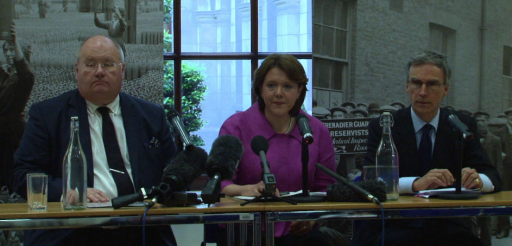Centenary News’ Peter Alhadeff attended this morning’s press conference organised by the British Government and has compiled this report.
Britain’s Culture Secretary, Maria Miller, says the Government has produced a fitting programme of events to remember and mark the actions of men and women from Britain, the Commonwealth and all the nations involved in the First World War.
“On 4th August 1914 we entered a war like no other the world had seen. It is right we remember and mark the centenary of this momentous day in the world’s history, bringing its importance alive for younger generations and remembering the price that was paid by all involved.”
The Centenary events will start on 4th August 2014 with a service of commemoration at Glasgow Cathedral, attended by Commonwealth leaders a day after the closing ceremony for the Commonwealth Games.
A vigil at Westminster Abbey will conclude with the last candle being extinguished at eleven o’clock in the evening, marking the moment Britain declared war.
The four-year programme also includes a nationwide cultural festival and a project enabling thousands of pupils from state schools to visit the battlefields.
Speaking at a press conference in Westminster to launch the plans, Mrs Miller paid tribute to the incredible fortitude and resilience shown by British forces during the war.
The Culture Secretary also defended the Anglo-German focus for a ceremony at the St Symphorien military cemetery on the Belgian battlefield of Mons, the last resting place for an equal number of British and German soldiers.
Mrs Miller said the event would honour shared sacrifices: “We can equally come together with all of those who were involved, on whichever side, to mark the contribution that was made.
“This is a shared history that we have. It’s an important shared history that’s not only shaped the Europe that we have today but has done so much to shape the world.
“I think we can take the pride in the actions of our military people as well as well working together with those who were on the other side too.”
The Communities Secretary, Eric Pickles, warned: ” it would be a tremendous tragedy if this became an anti-German, anti-Turkish festival. But equally it would be a tragedy if we forgot what happened and if we forgot why we fought, if we forgot who won.”
The unusual scale of the challenge ahead was acknowledged by Dr Andrew Murrison MP, who is Prime Minister David Cameron’s Special Representative for the Centenary Commemoration.
“We have never done a four-year anniversary before,” he told the press conference.
“It will be a marathon and and not a sprint. It contain the kinds of things you would expect and a few you might not. It will be played out internationally and domestically, with a very strong Commonwealth theme. It will be respectful, thoughtful and useful.”
However the military historian. Sir Max Hastings, has expressed concern about the British Government’s approach. Speaking on BBC Radio 4’s Today programme, he said not enough was being done to explain to a new generation why the war was fought.
“On the British government side at the moment, what they call a non-judgemental approach seems to mean that they’re not willing to say outright what the historians I respect most believe, which is the First World War was not morally different from the Second World War.
“It was an unspeakable experience for Europe and the British people but it was for a cause worth fighting. It was as important that we prevailed over the Germany of that period as it was over the Germany of the Nazi era.”
Sir Max suggested ministers were frightened of taking any view that might be seen as upsetting Germany.
Questioned at Monday’s press conference, Maria Miller said it was important for the Government to do everything that it could to help the next generation understand the facts.
She said: “That’s why we’re putting so much emphasis on making sure that youngsters who are in their secondary schools today get the opportunity to visit those battlefields and to be able to take back to their own schools and their own communities the experiences that they have there.
“I think it’s by arming people with the facts that they can come to their own conclusions. But certainly it’s important that our troops prevailed and that today we have a stronger Europe as a result.”
© Centenary Digital Ltd & Author
